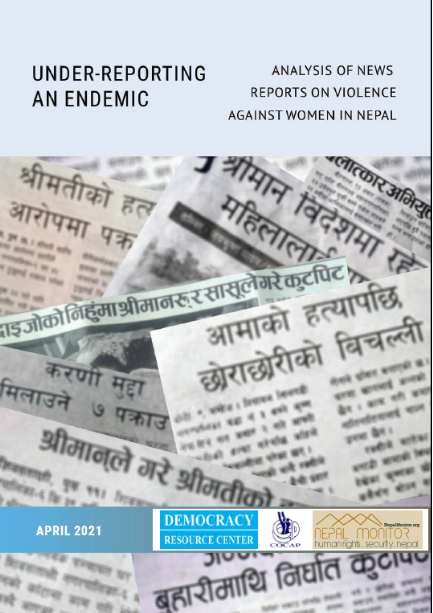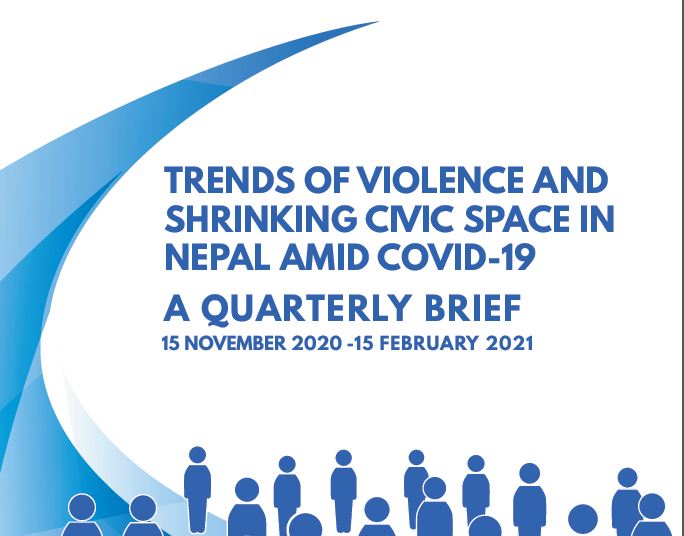Incident Reports
Statute discriminates against women: Activists
2015-12-12
Women rights activists have rued the fact the constitution has failed to ensure the fundamental rights of women. They said the constitution, which states that it will not discriminate on the basis of sex and marital status, has gone against the very statement by denying women the right to pass on citizenship to their children, something Nepali men are entitled to. “In regards to the previous one, this constitution is a lot more progressive as far as women rights are concerned. But it has still failed to grant women the equal status as the men by denying them the right to pass on citizenship to their children,” said advocate Mira Dhungana. She argued that even though the constitution after various amendments to the draft had stated either of the parents could be Nepali for a child to obtain citizenship by descent, in reality, it is still impossible for a Nepali mother to pass on citizenship to her children without proving the identity of her spouse.
Article 11.2 of the new constitution says a person whose father ‘or’ mother is a Nepali at the time of his or her birth can become Nepali citizen by descent. However, subsequent clauses 3 and 4 override the previous clause, which says both parents have to be Nepali for their children to acquire citizenship by descent, said, legal experts. The Interim Constitution 2007 had a provision that any person whose father or mother is a citizen of Nepal could get citizenship by descent. Dhungana pointed out that there is gender discrimination regarding naturalised citizenship as well. “Contrary to the statement in the constitution which says that there shall be no discrimination among citizens on the basis of marital status, gender discrimination prevails on naturalised citizenship as well.
A foreign spouse of a Nepali man can obtain Nepali citizenship soon after the marriage. There is no such provision for foreign spouses of Nepali women,” added Dhungana. Existing laws allow non-Nepali women married to Nepali men to become citizens soon after they start the process of renouncing their original nationalities. But the constitution does not specify how long non-Nepali men married to Nepali women have to wait before they can apply for Nepali citizenship. Article 11.7 further states that children of Nepali women married to non-Nepali men will not receive naturalised citizenship unless the husband becomes a Nepali citizen. No such provision exists for children of Nepali men married to non-Nepalis. Similarity, women right activists also rued the fact that lawmakers had refrained from adding the word ‘patriarchy’ in the preamble despite a lot of hue and cry from them, which according to them, means the new constitution does not recognise discrimination due to the patriarchal norms in our society.
Related Reports
GBV / Siraha
Complaint lodged against a 30-year-old man on the charge of raping a 13-year-old teenage girl in Siraha
GBV / Okhaldhunga
52-year-old man arrested on the charge of sexually assaulting a 16-year-old teen girl in Okhaldhunga
GBV / Humla
Teen boy arrested on the charge of raping a 40-year-old woman in Humla
GBV / Rupandehi
Complaint lodged against a 22-year-old youth on the charge of raping a minor girl in Rupandehi
GBV / Bhaktapur
25-year-old man arrested on the charge of harassing girl over social media
Related Trend Analysis
Analysis

THE NEPAL PEACE MONITOR ANNUAL REVIEW: 2020
October 25, 2021
Human Trafficking / LGBT+ Rights / GBV / Political / Children’s Rights / Senior Citizens’ Rights / HRD Issues / Human Rights / Interpersonal Violence / Governance / Covid-19 / Civic-Space / PwD
Analysis

COCAP BIWEEKLY: INCIDENTS SURROUNDING COVID-19 MARCH 1 - 15, 2021
March 25, 2021
GBV / Governance / Covid-19
_001.png)




